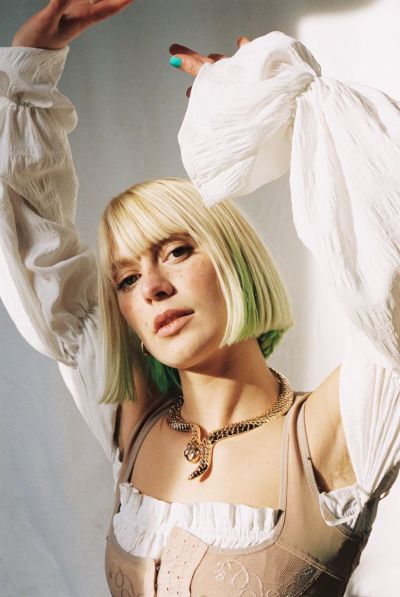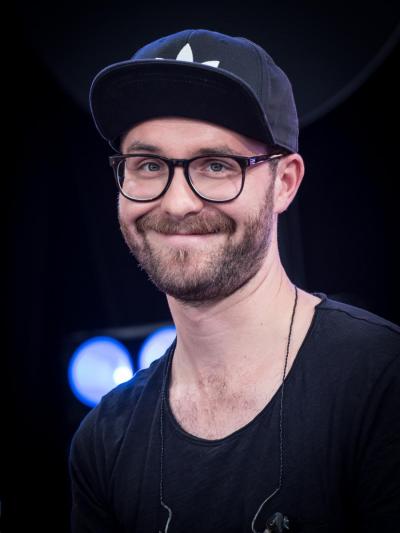Alli Neumann

Alli Neumann describes the decade in which she was anything but financially successful as the longest stage of her career to date. She has always loved making music and performing with various blues and rock bands, but early on, poorly attended gigs, low fees, and muted reactions could make even a positive individual like Alli Neumann doubt her own decisions. Would the naysayers who had dismissed her dream of a singing career as naive end up being right? Were talent and dedication alone perhaps not enough to make a name for oneself?
Neumann developed a profound relationship with music at an early age. As a child, she discovered a Connie Francis record with her father at a flea market and was enthralled by songs like “Schöner fremder Mann” (“Handsome, strange man”). Already self-assured and a keen performer as a tiny tot, she performed songs by Connie Francis and France Gall in retirement homes. When her interest in German Schlager music waned, Alli Neumann learnt to play the guitar and tried her hand at blues, a style of music that is hugely popular in Poland and to which she was introduced there at an early age by her maternal grandfather. He was a great blues lover and played the mandolin and violin, while her mother played the trombone. Alli made music and sang with adults from an early age: songs by Czesław Niemen or Stare Dobre Małżeństwo were popular choices. She later discovered the musician Maryla Rodowicz as an inspiration, along with the lyrics of Agnieszka Osiecka, which Neumann describes as “timeless” and “poetic”. Further role models cited by the artist include strong Polish women such as Renata Przemyk and Agnieszka Chylińska, but also Ralph Kaminski and Brodka. Gwen Stefani, Prince, Oasis, and Alanis Morissette are also among Neumann’s early influences and she remembers city festivals where she performed covers of their songs. These days, she describes her own musical style as “alternative pop music with distorted guitars and a dash of funk and blues”. Then she adds: “But actually, I don’t really know. I love so many different genres and don’t want to pigeonhole myself.”
Alli Neumann began writing her own songs as a teenager. In a video interview, she wryly comments on her youth in North Frisia: “You could either spend your days drinking or making music.” She was immersed in the music scene at the “Ton-Steine-Scherben” House (named after the infamous German band) in Fresenhagen and was encouraged by Jochen Hansen, Rio Reiser's former bassist, to compose her own songs. At the tender age of 14, she signed a record deal and promptly dropped out of school. Looking back, she considers the decision to be a “total disaster” and says: “I wasn't at all ready for it yet. And I think I also made pretty terrible music.”
Alli Neumann changed tack, finished school after all, and then got off to a flying start: in 2018, she played one of the two leading roles in Kim Frank’s TV film “Wach”. In the same year, she released her first EP as a solo artist, “Hohes Fieber”. In 2019, she released her second EP, “Monster”. With the single “Zeit steht” (a collaboration with the singer Trettmann and his producer team “Kitschkrieg”), Neumann scored a hit that made it into the top ten of the German charts and has been streamed over 40 million times to date. In 2020, Neumann played a leading role in Detlev Buck’s gangster comedy “Christmas Crossfire”.
The following year would be a very special one for Alli Neumann, as she launched her own music label JAGA Recordings in 2021, under which she released her first full album in partnership with the Sony Music company “Four Music”. It bears the title “Madonna Whore Komplex”, by which Neumann takes aim at Freud’s assumption that, from a male perspective, women are often either whores or saints. Neumann challenges this simplistic, sexist categorisation with the empowering message that people can free themselves from role models and be anything they want. Just as on the EPs, the songs on Alli Neumann’s successful debut are sung in German.
In her youth, Alli Neumann sang her songs in English. When friends said to her: “You should sing in German, that would be even cooler”, she didn’t really follow – until one day she spontaneously translated the lyrics of a song into German to show the others just how stupid it sounded. But it didn’t. She was struck by how the words now had a much more direct impact.
Alli Neumann has two native languages: German and Polish. Her Polish mother initially moved to her German father’s home country, but felt rather isolated there. She longed to return to the country where her friends and family lived. And so, little Alina-Bianca moved with her parents to a town near Rzeszów, the capital of the Carpathian Voivodeship in south-eastern Poland, shortly after her birth in Solingen. She has fond memories of her time in her mother’s homeland: “I loved my childhood in Poland”, she says. “We lived on a farm with all kinds of animals. And there were lots of children around and I actually lived all over the village: sometimes I had sleepovers at my aunt’s, sometimes with the neighbours’ children.” Alli Neumann treasures the memory of this carefree time full of effortless closeness to her parents, sisters, relatives, and friends. To this day, she relives the glorious days of her childhood whenever she is in Poland. She loves Polish music, the language, and the “beautiful cities that are so full of art and history”. She is also deeply impressed by the Solidarność movement, through which large sections of the Polish population practised peaceful protest for decades. Nowadays, Alli Neumann admires the tenacity with which women stand up for their rights as part of the “Strajk Kobiet” (“Women’s Strike”) in Poland.
Alli Neumann travels to Poland, where most of her family lives, at least once or twice a year. The singer also has friends in Warsaw and Kraków. Kraków in particular has a magical pull on her: “It’s the most inspiring city for me when it comes to writing,” she says and adds: “I love to sit in the café in Kazimierz and read or write.”
But the artist also feels at home in Germany. She is especially fond of the north and describes Hamburg as providing the perfect blend of “society in all its facets and Nordic serenity” and the Hanseatic mentality as “down-to-earth yet cosmopolitan”. Neumann finds the collaboration and friendship with people from a wide range of scenes and cultures very enriching, but would like to see Polish culture become more visible. She says: “It was only through Strajk Kobiet that I met new Polish friends in Germany. I think it would be great if we as a Polish community would also get together more often in a more light-hearted context.” According to Neumann, Poles often only practise their culture in private and present themselves as assimilated Germans in public. She dreams of a Polish festival in Hamburg: “Brodka, Quebonafide, Ofelia – everyone should perform there. And we’ll have zapiekanka and kvass on every corner!”
Anselm Neft, January 2022
The artist online:


